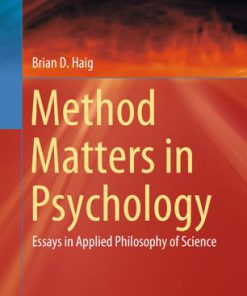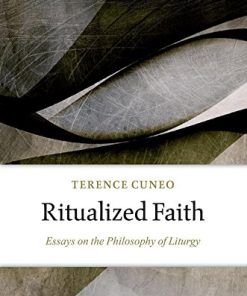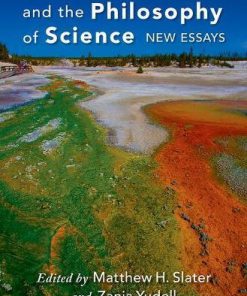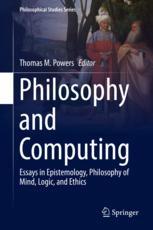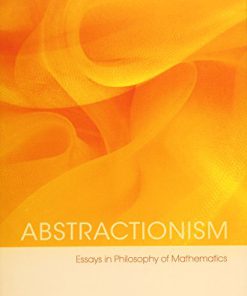Essays in the Philosophy of Chemistry 1st Edition by Grant Fisher, Eric Scerri 019049459X 9780190494599
$50.00 Original price was: $50.00.$25.00Current price is: $25.00.
Essays in the Philosophy of Chemistry 1st Edition by Grant Fisher, Eric Scerri – Ebook PDF Instant Download/DeliveryISBN: 019049459X, 9780190494599
Full download Essays in the Philosophy of Chemistry 1st Edition after payment.
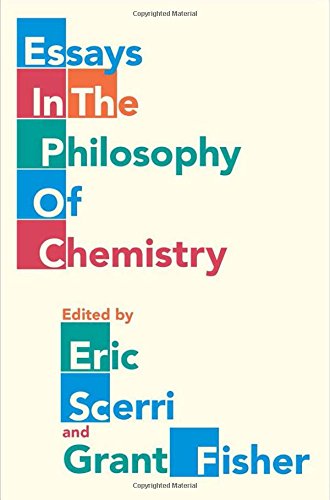
Product details:
ISBN-10 : 019049459X
ISBN-13 : 9780190494599
Author: Grant Fisher, Eric Scerri
The philosophy of chemistry has emerged in recent years as a new and autonomous field within the Anglo-American philosophical tradition. With the development of this new discipline, Eric Scerri and Grant Fisher’s “Essays in the Philosophy of Chemistry” is a timely and definitive guide to all current thought in this field. This edited volume will serve to map out the distinctive features of the field and its connections to the philosophies of the natural sciences and general philosophy of science more broadly. It will be a reference for students and professional alike. Both the philosophy of chemistry and philosophies of scientific practice alike reflect the splitting of analytical and continental scholastic traditions, and some philosophers are turning for inspiration from the familiar resources of analytical philosophy to influences from the continental tradition and pragmatism. While philosophy of chemistry is practiced very much within the familiar analytical tradition, it is also capable of trail-blazing new philosophical approaches. In such a way, the seemingly disparate disciplines such as the “hard sciences” and philosophy become much more linked.
Essays in the Philosophy of Chemistry 1st Table of contents:
Part One History and Philosophy of Chemistry
Chapter 1 Robert Boyle’s Corpuscular Chemistry: Atomism before Its Time
1 Introduction
2 Boyle’s Distinction between Intermediate and Ultimate Causes
3 Boyle’s Experimental Chemistry and Its Relation to Philosophy
4 Boyle’s Mode of Defense of the Corpuscular Philosophy
5 Boyle’s Chemistry and Support for the Mechanical Philosophy
6 The Mechanical Philosophy as a Guide for Chemists
7 The Introduction of Intermediate Causes into Chemistry
Concluding Remarks
Chapter 2 What Was Revolutionary about the Chemical Revolution?
1 A Brief Historiography
4 Not Such a Kuhnian Revolution
5 The Ultimate Revolution in Chemistry
Chapter 3 Philosophical Issues in (Sub)Disciplinary Contexts. The Case of Quantum Chemistry
1 Revisiting the History of Quantum Chemistry
2 The Role of Theory in Chemistry
3 Experiments through Computers
4 Old Problems (Re)Considered
Conclusions
Part Two Reduction and Explanation
Chapter 4 Reality without Reification: Philosophy of Chemistry’s Contribution to Philosophy of Mind
1 First Enquiry: The Co-Definition of the Levels of Organization
2 Second Enquiry: Relata, Relations, and Affordances
3 Third Enquiry: Chemical Mereology and Downward Causation
4 Toward Non-Ontological Conceptions of Emergence and Downward Causation
Conclusion
Chapter 5 Who’s Afraid of Supervenient Laws?
1 Supervenience
2 Laws
3 An Example from Chemistry
Conclusion
Chapter 6 The Changing Views of a Philosopher of Chemistry on the Question of Reduction
1 The Question of Reduction
2 The Periodic System—Easily the Biggest Idea in Modern Chemistry
3 A Little More History
4 But Not Everything Is Derived from Quantum Mechanics
5 The Current Situation: Anti-reductionism No Longer Seems So Clear-Cut
6 Another Twist: Those Anomalous Configurations—The Good Side of Reduction
7 How Is an Electronic Configuration Obtained from Experimental Data?
Conclusions
Chapter 7 Contingencies in Chemical Explanation
Introduction
1 The Explanatory Core of Traditional Chemistry
2 Recognizing the Role of Contingency
3 Implications for Chemistry Education
4 Implications of Contingent Chemistry for Philosophy of Science
Chapter 8 Reaction Mechanisms
1 Historical Background
2 Philosophical Considerations
Concluding Remarks
Part Three Metaphysical Issues
Chapter 9 Causality in Chemistry: Regularities and Agencies
1 The Grammar of Event Causality
2 The Grammar of Agent Causality
3 Causal Laws and Counterfactuals
4 The Possession of Powers
5 A Hybrid Structure
6 Versions of Causality in Chemistry
7 Historical Development of the Chemistry of Substance Stability
8 The Chemist as Powerful Particular
Conclusion
Chapter 10 How Properties Hold Together in Substances
1 What Has Chemistry to Do with Philosophy?
2 Properties of Chemical Systems
3 Coherence
4 Varieties of Closure
5 Structures and Properties
6 Causes and Determinants
Chapter 11 Scientific Realism and Chemistry
1 Unobservable Entities
2 The Nature of Models
3 Interventions and Practical Success
4 Preservative Realism versus Conservationist Pluralism
5 Reduction and Levels of Analysis
Summary
Chapter 12 Natural Kinds in Chemistry
1 Chemical Kinds
2 Chemical Kinds as Natural Kinds
3 Two Views of Chemical Substances
Conclusion
Part Four Theory and Practice
Chapter 13 Chemistry and “The Theoretician’s Dilemma”
1 “The Theoretician’s Dilemma”
2 Quantification and Truth-maker Theory: Two Varieties of Ontology
3 Two Chemical Examples
4 Theoretical Promiscuity and the Chemical Object
Conclusion
Chapter 14 Divergence, Diagnostics, and a Dichotomy of Methods
1 Modeling Pericyclic Reactions
2 Computational Models
3 Robustness and Tradeoffs
4 Diagnostics
5 Applicability and Intelligibility
Concluding Remarks
Chapter 15 Mathematical Chemistry, a New Discipline
1 Defining Mathematical Chemistry
2 Exploring Disciplinary Criteria of Mathematical Chemistry
Conclusions and Outlook
Chapter 16 Science, φ-Science, and the Dual Character of Chemistry
1 Introduction
2 Why Has Physics Obtained the Status of the Paradigm of Science? A Practical Realist Account of the Question in Historical Context
3 The Relevance of Kant’s Legacy to The Philosophy of Chemistry
4 The Task of Philosophy of Science
5 A Theoretical Model of Science—φ-Science—as a Galilean Idealization
6 Two Main Types of Cognition and the Dual Character of Chemistry
People also search for Essays in the Philosophy of Chemistry 1st:
what is philosophy essay
philosophy in chemistry
why chemistry essay
essays biochem
chemistry essays
Tags: Essays, the Philosophy, Chemistry, Grant Fisher, Eric Scerri
You may also like…
Politics & Philosophy - Anthropology
Tercentenary Essays on the Philosophy and Science of Leibniz 1st Edition Lloyd Strickland
Politics & Philosophy - Anthropology
Politics & Philosophy - Anthropology
Aesthetic Pursuits: Essays in Philosophy of Art 1st Edition Jerrold Levinson
Religion & Spirituality
Politics & Philosophy
Tercentenary Essays on the Philosophy and Science of Leibniz 1st Edition Lloyd Strickland
Politics & Philosophy - Anthropology
Politics & Philosophy - Philosophical Positions & Movements




